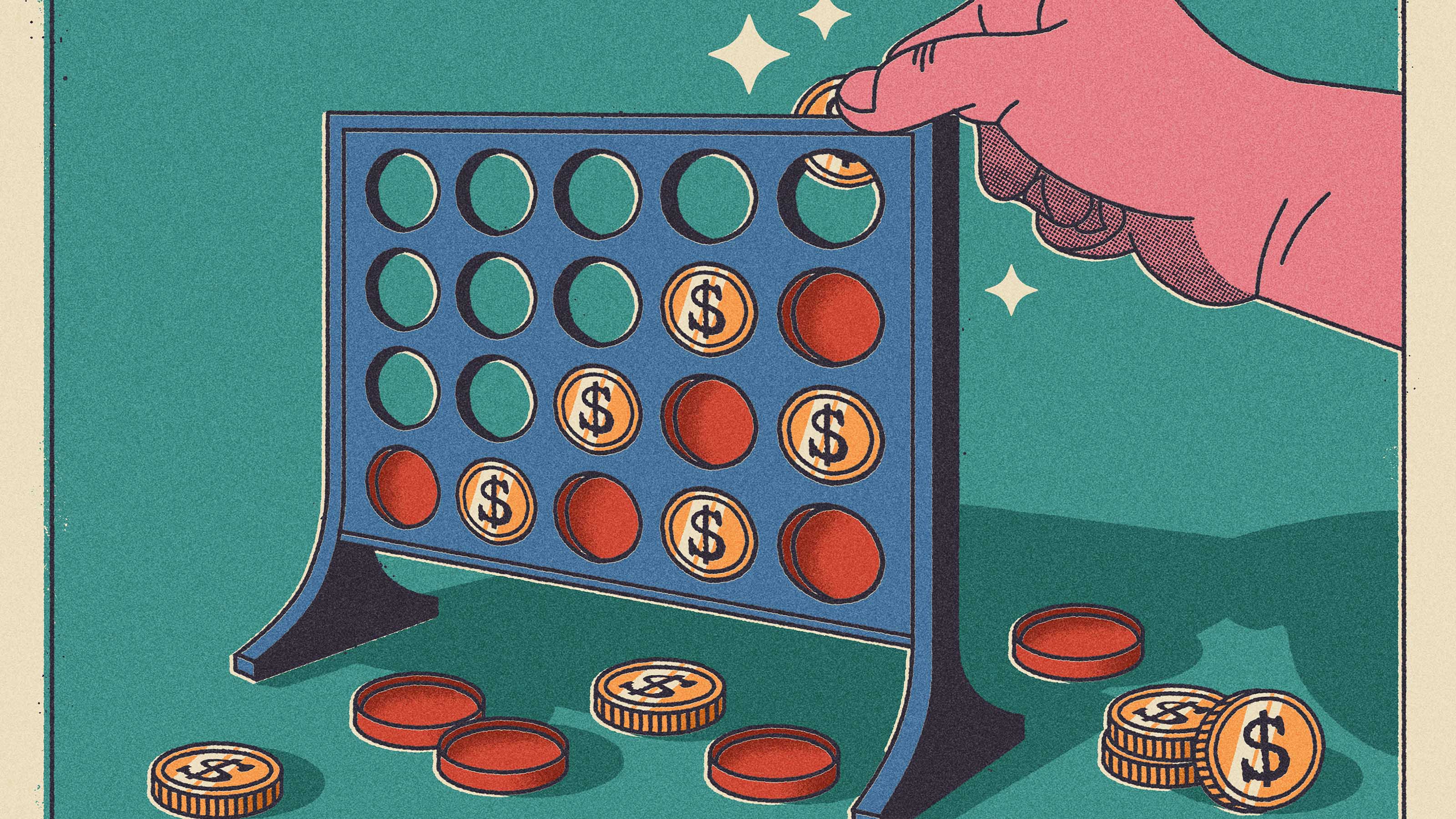How Doing Nothing Can Pay Off for Investors
For the three-month period during which I essentially ignored my investments, the Practical Investing portfolio rose 10%.

Profit and prosper with the best of Kiplinger's advice on investing, taxes, retirement, personal finance and much more. Delivered daily. Enter your email in the box and click Sign Me Up.
You are now subscribed
Your newsletter sign-up was successful
Want to add more newsletters?

Delivered daily
Kiplinger Today
Profit and prosper with the best of Kiplinger's advice on investing, taxes, retirement, personal finance and much more delivered daily. Smart money moves start here.

Sent five days a week
Kiplinger A Step Ahead
Get practical help to make better financial decisions in your everyday life, from spending to savings on top deals.

Delivered daily
Kiplinger Closing Bell
Get today's biggest financial and investing headlines delivered to your inbox every day the U.S. stock market is open.

Sent twice a week
Kiplinger Adviser Intel
Financial pros across the country share best practices and fresh tactics to preserve and grow your wealth.

Delivered weekly
Kiplinger Tax Tips
Trim your federal and state tax bills with practical tax-planning and tax-cutting strategies.

Sent twice a week
Kiplinger Retirement Tips
Your twice-a-week guide to planning and enjoying a financially secure and richly rewarding retirement

Sent bimonthly.
Kiplinger Adviser Angle
Insights for advisers, wealth managers and other financial professionals.

Sent twice a week
Kiplinger Investing Weekly
Your twice-a-week roundup of promising stocks, funds, companies and industries you should consider, ones you should avoid, and why.

Sent weekly for six weeks
Kiplinger Invest for Retirement
Your step-by-step six-part series on how to invest for retirement, from devising a successful strategy to exactly which investments to choose.
The first thing I used to ask my children when I returned from a business trip was, “Did you miss me?” By the time they were teens, they would respond to my reappearances with highly developed sarcasm: “Were you gone?” So for those of you who might ask the same question (sarcastically or otherwise) about the recent absence of my column from these pages, I should mention that I’ve been on a three-month sabbatical.
Sabbaticals are common in higher education. But I had never contemplated spending several months without paid work until a self-employed friend told me about her sabbatical. She regaled me with stories of traveling through Europe and spending a delicious amount of time with her family. “Isn’t this why we save?” she asked wisely.
I nodded and immediately vowed to take my own extended leave. But being my not-so-spontaneous self, I spent nearly a year plotting my sabbatical. That mainly involved warning everyone I write for that I wanted a lot of time off and was willing to schedule my disappearance so that I caused as little disruption as possible.
From just $107.88 $24.99 for Kiplinger Personal Finance
Become a smarter, better informed investor. Subscribe from just $107.88 $24.99, plus get up to 4 Special Issues

Sign up for Kiplinger’s Free Newsletters
Profit and prosper with the best of expert advice on investing, taxes, retirement, personal finance and more - straight to your e-mail.
Profit and prosper with the best of expert advice - straight to your e-mail.
Initially, I planned to travel. My husband and I made arrangements to spend a month in Asia, and I was mining a house-swapping website for more ideas. But, as luck would have it, a close relative became ill, and I decided I wanted to stay close to home. So I chose to refresh and rejuvenate without a plane ticket.
What did I do? I revamped the garden. I helped my husband paint and pick out flooring for a minor-turned-major remodel of our beach house. I went to many long lunches—during the workweek!—with friends and family. I took daily (sometimes twice-daily) walks with the dogs to teach them leash manners (a work still in progress). I changed my eating habits and lost several pounds that had attached themselves to my hips when I wasn’t looking. I spent several peaceful days paddleboarding and catching up with friends.
I also learned how to construct and launch a website (KathyKristof.com), and I completed the first draft of the mystery novel I’ve always wanted to write. (I expect that the friends I’ve asked to critique the draft will encourage me to keep my day job.) In short, I have never been so busy, and I loved every moment.
Blissful ignorance. What about my investments, you may wonder? Cue the crickets. Aside from milking dividends from my taxable portfolio (of which the Practical Investing portfolio is a relatively small part), I did nothing.
Of course, just because I was taking time off from work didn’t mean I stopped receiving investment news. Over the course of the three months, I saw headlines about a number of stocks that I own, including Apple (symbol AAPL), Intel (INTC) and Seagate Technology (STX). One screamed “Seagate must cut its dividend now!” Others warned about a sales slump at Apple and limited growth potential at Intel.
I responded to depressing pieces by deleting the articles without reading them. I sent to the electronic dustbin stories about global terrorism’s harmful impact of on airline stocks, such as Spirit (SAVE) and Copa Holdings (CPA). I trashed stories about Brexit, advising a few skittish friends to follow my Kiplinger colleague Jeff Kosnett’s advice to sit tight and expect Britain’s exit from the European Union to have little impact on our markets. And I ignored tales about today’s hot stocks, even though some of them dealt with real estate investment trusts, which I like and own both inside and outside the Practical Investing portfolio.
Yet for the three-month period during which I essentially ignored my investments, the portfolio rose 10%, to $297,246. The market, as measured by the Vanguard Total Stock Market ETF (VTI), which I use as my benchmark, was up just 6%. Clearly, doing nothing can sometimes pay off. I should do nothing more often.
Profit and prosper with the best of Kiplinger's advice on investing, taxes, retirement, personal finance and much more. Delivered daily. Enter your email in the box and click Sign Me Up.

-
 5 Vince Lombardi Quotes Retirees Should Live By
5 Vince Lombardi Quotes Retirees Should Live ByThe iconic football coach's philosophy can help retirees win at the game of life.
-
 The $200,000 Olympic 'Pension' is a Retirement Game-Changer for Team USA
The $200,000 Olympic 'Pension' is a Retirement Game-Changer for Team USAThe donation by financier Ross Stevens is meant to be a "retirement program" for Team USA Olympic and Paralympic athletes.
-
 10 Cheapest Places to Live in Colorado
10 Cheapest Places to Live in ColoradoProperty Tax Looking for a cozy cabin near the slopes? These Colorado counties combine reasonable house prices with the state's lowest property tax bills.
-
 The Most Tax-Friendly States for Investing in 2025 (Hint: There Are Two)
The Most Tax-Friendly States for Investing in 2025 (Hint: There Are Two)State Taxes Living in one of these places could lower your 2025 investment taxes — especially if you invest in real estate.
-
 The Final Countdown for Retirees with Investment Income
The Final Countdown for Retirees with Investment IncomeRetirement Tax Don’t assume Social Security withholding is enough. Some retirement income may require a quarterly estimated tax payment by the September 15 deadline.
-
 How to Beef Up Your Portfolio Against Inflation
How to Beef Up Your Portfolio Against Inflationinvesting These sectors are better positioned to benefit from rising prices.
-
 Taxable or Tax-Deferred Account: How to Pick
Taxable or Tax-Deferred Account: How to PickInvesting for Income Use our guide to decide which assets belong in a taxable account and which go into a tax-advantaged account.
-
 Smart Investing in a Bear Market
Smart Investing in a Bear Marketinvesting Here's how to make the most of today’s dicey market.
-
 How to Open a Stock Market Account
How to Open a Stock Market Accountinvesting Investing can be fun, but you need a brokerage account to do it. Fortunately, it’s easy to get started.
-
 The Right Dividend Stock Fund for You
The Right Dividend Stock Fund for YouBecoming an Investor Dividend stock strategies come in many different flavors. Here's what to look for.
-
 Alternative Investments for the Rest of Us
Alternative Investments for the Rest of UsFinancial Planning These portfolio diversifiers aren't just for the wealthy.